
 |
|
|
|
Film enthusiasts think themselves fortunate if they've chanced upon the stylish French crime thrillers of Jean-Pierre Melville, the director in the white cowboy hat who went his own way during the years of the Nouvelle Vague. Melville also made several classics about the German Occupation of France during WW2, the most famous being 1970's Army of Shadows. The director's 1961Léon Morin, Priest departed from his usual thriller formulas. He filmed many of the subplots in Béatrix Beck's novel, but before release jettisoned most of them in favor of the central relationship between a young priest and an atypical parishioner. Produced by New Wave underwriter Georges Beauregard and the deep-pocket Italian Carlo Ponti, Léon Morin, Priest stars two "hot" actors of the time, Jean-Paul Belmondo and Emmanuelle Riva. Well received in Europe, it was not shown in America until 2009. 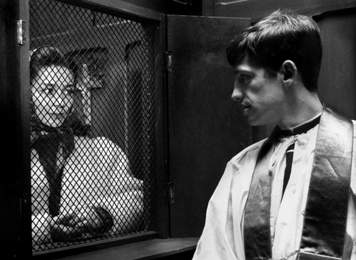
Léon Morin, Priest takes place in the French Alps, which are occupied first by Italian troops and then by Germans. The widow of a Jew with a young daughter to care for, Barny (Emmanuelle Riva) joins with two other Jewish mothers whose husbands are fighting in the partisan resistance, in protecting their children by having them baptized as Catholics. The local diocese conspires in the practice, and from time to time individual priests even hide Jews. Barny mischievously enters a confessional to goad a priest about the church's various scams to circumvent wartime shortages. To her surprise, she finds that the responses of Father Léon Morin (Jean-Paul Belmondo) are frank, intelligent and provocative. Barny ends up visiting Morin every week, borrowing books and continuing their discussion. She becomes smitten but the priest remains an enigma, staying at arm's length yet giving off hints easily interpreted as a flirtation. As the occupation drags on, Barny's fascination leads to frustration... Melville gives Léon Morin, Priest an impressive novel-like sprawl, even though its scope remains very small. We never doubt the presence of occupying troops and the possibility of trouble with the Germans, even though they appear only now and then. One German officer seen only in a brief shot is played by Howard Vernon, a probable cameo-reference to Melville's first feature film La silence de la mer. Barny is amused by the Italian troops' feathered hats, and impressed when she learns that a German soldier has been unusually kind and friendly to her little daughter. 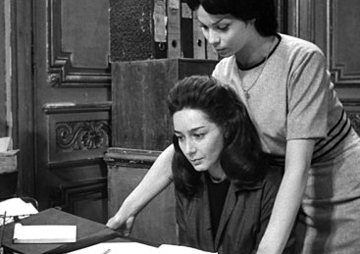
We see Barny's tangential relationship to workers at the correspondence school. In the absence of eligible males she forms a crush on her female supervisor, who she describes as an ideal woman. A professor takes his leave after radically changing his appearance; he's a Jew and has decided to go underground. Co-worker Christine (Irène Tunc), an unrepentant petty collaborator, frets that she'll be punished when the Germans leave. Christine also gravitates toward the priest Morin and feels just as excited by him as does Barny. Other young women visit, including an adventuress determined to seduce the handsome young man. He instead converts her, at least for a time, into a church-attending penitent. The bulk of Léon Morin, Priest centers on Barny's visits with Morin. She's impressed and stimulated by his sharp mind and his incisive answers to her sometimes-disrespectful questions. Morin talks about the necessity of the church to advance and takes unexpected positions on church dogma. Eternal life to him is a question of grace, not faith. When Barny announces that she's "surrendering" and wants to take communion, Morin forces her to admit that she hasn't made a conscious choice, and encourages her to reassess her position. But Morin also opens up about his childhood as a delinquent and gives other signals that are easily interpreted as affection. When Barny responds to these ambiguous signs, Morin rudely rebuffs her. The movie carries a real tension. Any viewer will be convinced that Morin is using his charisma and attractiveness to lure these women closer to the church, but it is more difficult to conclude that Morin is toying with Barny's affections to satisfy his own urges. If one's actual actions are the proof, he never does anything to overtly encourage an inappropriate relationships. Quite the contrary -- he's at times quite firm and cold. 1 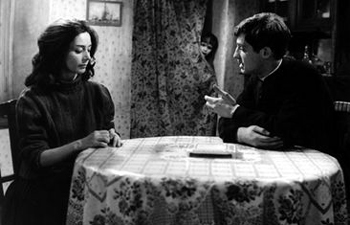
The film is a revelation for fans of Jean-Paul Belmondo, who gives a performance of exceeding sensitivity and intelligence. We're so used to Belmondo projecting a standard star presence that the subtleties in his Léon Morin come as a complete surprise. That assessment goes for director Melville as well; this is perhaps his most absorbing character study. We think of Melville as a stylist, the man who put France back on the map as a maker of noir- inflected thrillers. Léon Morin, Priest brings an uncommon depth to novel-film adaptations. We feel the tension as the Germans round up Jews and draft dodgers (reduced in the film to a single shot of an arrest reflected in a store window). We're primed to expect denouncements and tragedies that never come about. When news of an arrest or a death does happen, it's second-hand news. More typical is the professor who decides to become a fugitive. Barny makes a brief contact with him, and probably never finds out what becomes of the brave man. 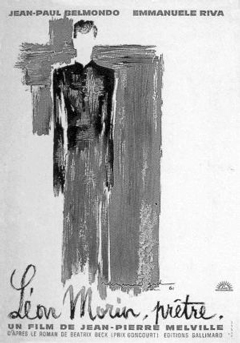
A Melville movie with a woman as its central character is unusual, but we must chalk up the success of the character Barny to the amazing Emmanuelle Riva. Nobody communicates "soul" as strongly as Ms. Riva, whether expressing inner torment (Hiroshima, mon amour), anxiety (Adua and Her Friends or homicidal despair (Thérèse Desqueyroux). Riva's Barny can be playful -- reprimanded by a German guard, she skips away like a schoolgirl. She maintains a serious decorum at work but when provoked by Christine delivers a wickedly sharp slap to the face. Barny accepts the help of two American soldiers, knowing full well that they might expect sexual favors in return. It's clear that the priest Morin engages and intrigues her on several levels, and she's surprised to find that their philosophical discussions are intellectually stimulating. But Morin's ultimate goal is to bring Barny further into the faith, while Barny finds herself drawn more closely to the man himself. The Criterion Collection's Blu-ray of Léon Morin, Priest is a picture-perfect widescreen transfer of this impressively-filmed show. Cinematographer Henri Decaë's images of rural France often resemble charcoal sketches. Every aspect of the show makes a special impact, from Martial Solal's unusual music score to the main titles, in which a simple animated graphic design never definitely forms a Christian cross. Disc producer Kate Elmore's extras include a 1961 TV interview with Jean-Pauls Belmondo and Melville, a selected-scene commentary by Ginette Vincendeau, a trailer and two deleted scenes that remain of the many subplots that were dropped when Melville decided to condense the scope of the story. The insert booklet contains an essay by Gary Indiana and text excerpts from Rui Nogueira's interview book Melville on Melville. 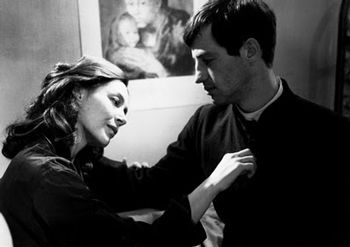
Léon Morin, Priest illustrates the gulf between sophisticated adult filmmaking in Europe and the U.S.. An American director proposing a film idea like this one in the early 1960s would be stymied by commercial necessities, and bullied by the Catholic-influenced Production Code office. Fred Zinnemann's exceptional The Nun's Story is fairly frank and uncompromising, yet seems constricted when compared to Melville's far more open film. In an attempt to shock father Morin, Barny actually describes her sex life to him. We also learn that Morin's church is involved in a number of questionable activities, such as using counterfeit money. It's no wonder that Melville's film, despite its star cast, did not receive even a token U.S. art house run when it was new.
On a scale of Excellent, Good, Fair, and Poor,
Léon Morin, Priest Blu-ray rates:
Footnotes:
1. The religious discussions between Barny and Morin are both dramatically and intellectually exciting. Terrence Malick builds his entire film The Tree of Life around the question of whether Life is fundamentally a matter of Grace or of Nature. Béatrix Beck sets Morin and Barny's dialogue on the question of distinguishing Grace from Faith. Barny tries to trip up the priest by complaining that the church requires belief (Faith) be saved, to join with the Kingdom of God. Morin shocks Barny with an opposite view, that there is a "wider church" (of many mansions) that accepts anyone possessed of Grace. Therefore a good man outside the teachings of the church can find a place in the Kingdom of God. Barny recalls that every churchman she's met demands unquestioning Faith as the price of salvation, when any reasoning person can see that there is no proof to back up the church's teachings. Morin counters this immediately by saying that many people believe in Love, yet don't question their belief or ask for proof. It makes for a powerful argument, that coincidentally applies to Barny's own situation -- is she there out of religious curiosity, or love for the priest Morin?
Reviews on the Savant main site have additional credits information and are often updated and annotated with reader input and graphics. Also, don't forget the 2011 Savant Wish List. T'was Ever Thus.
Review Staff | About DVD Talk | Newsletter Subscribe | Join DVD Talk Forum |
| ||||||||||||||||||